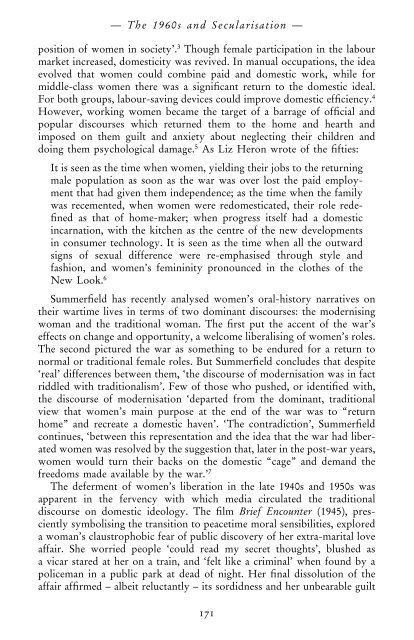The Death of Christian Britain
The Death of Christian Britain
The Death of Christian Britain
Create successful ePaper yourself
Turn your PDF publications into a flip-book with our unique Google optimized e-Paper software.
— <strong>The</strong> 1960s and Secularisation —<br />
position <strong>of</strong> women in society’. 3 Though female participation in the labour<br />
market increased, domesticity was revived. In manual occupations, the idea<br />
evolved that women could combine paid and domestic work, while for<br />
middle-class women there was a significant return to the domestic ideal.<br />
For both groups, labour-saving devices could improve domestic efficiency. 4<br />
However, working women became the target <strong>of</strong> a barrage <strong>of</strong> <strong>of</strong>ficial and<br />
popular discourses which returned them to the home and hearth and<br />
imposed on them guilt and anxiety about neglecting their children and<br />
doing them psychological damage. 5 As Liz Heron wrote <strong>of</strong> the fifties:<br />
It is seen as the time when women, yielding their jobs to the returning<br />
male population as soon as the war was over lost the paid employment<br />
that had given them independence; as the time when the family<br />
was recemented, when women were redomesticated, their role redefined<br />
as that <strong>of</strong> home-maker; when progress itself had a domestic<br />
incarnation, with the kitchen as the centre <strong>of</strong> the new developments<br />
in consumer technology. It is seen as the time when all the outward<br />
signs <strong>of</strong> sexual difference were re-emphasised through style and<br />
fashion, and women’s femininity pronounced in the clothes <strong>of</strong> the<br />
New Look. 6<br />
Summerfield has recently analysed women’s oral-history narratives on<br />
their wartime lives in terms <strong>of</strong> two dominant discourses: the modernising<br />
woman and the traditional woman. <strong>The</strong> first put the accent <strong>of</strong> the war’s<br />
effects on change and opportunity, a welcome liberalising <strong>of</strong> women’s roles.<br />
<strong>The</strong> second pictured the war as something to be endured for a return to<br />
normal or traditional female roles. But Summerfield concludes that despite<br />
‘real’ differences between them, ‘the discourse <strong>of</strong> modernisation was in fact<br />
riddled with traditionalism’. Few <strong>of</strong> those who pushed, or identified with,<br />
the discourse <strong>of</strong> modernisation ‘departed from the dominant, traditional<br />
view that women’s main purpose at the end <strong>of</strong> the war was to “return<br />
home” and recreate a domestic haven’. ‘<strong>The</strong> contradiction’, Summerfield<br />
continues, ‘between this representation and the idea that the war had liberated<br />
women was resolved by the suggestion that, later in the post-war years,<br />
women would turn their backs on the domestic “cage” and demand the<br />
freedoms made available by the war.’ 7<br />
<strong>The</strong> deferment <strong>of</strong> women’s liberation in the late 1940s and 1950s was<br />
apparent in the fervency with which media circulated the traditional<br />
discourse on domestic ideology. <strong>The</strong> film Brief Encounter (1945), presciently<br />
symbolising the transition to peacetime moral sensibilities, explored<br />
a woman’s claustrophobic fear <strong>of</strong> public discovery <strong>of</strong> her extra-marital love<br />
affair. She worried people ‘could read my secret thoughts’, blushed as<br />
a vicar stared at her on a train, and ‘felt like a criminal’ when found by a<br />
policeman in a public park at dead <strong>of</strong> night. Her final dissolution <strong>of</strong> the<br />
affair affirmed – albeit reluctantly – its sordidness and her unbearable guilt<br />
171








